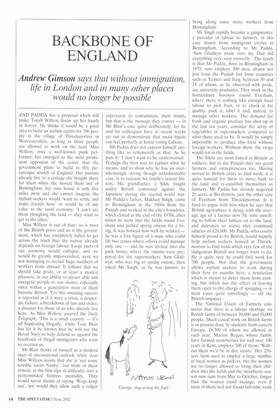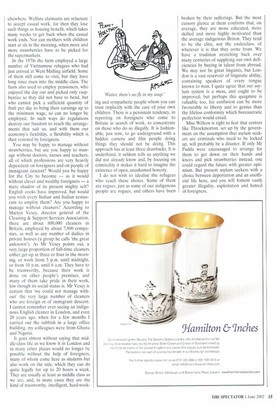BACKBONE OF ENGLAND
Andrew Gimson says that without immigration,
life in London and in many other places would no longer be possible
ZAD PADDA has a proposal which will make Toyah Willcox throw up her hands in horror. He thinks it would be a good idea to build an asylum centre for 700 people in the village of Throckmorton in Worcestershire, as long as those people are allowed to work on the land. Miss Willcox, once a well-known punk performer, has emerged as the most prominent opponent of the centre that the government plans to build in this picturesque stretch of England. Her parents already live in a cottage she bought there for them when she moved them out of Birmingham: her own house is only five miles away and she cannot imagine the asylum seekers would 'want to settle and make friends here' or would be of any value to the rural economy: 'I can't see them ploughing the land — they want to get to the cities.'
Miss Willcox is out of date: so is most of the British press and so is the government, which has completely failed to get across the truth that the nation already depends on foreign labour. Large parts of our economy would collapse, and we would be greatly impoverished, were we not managing to recruit huge numbers of workers from abroad. It follows that we should take pride, or at least a modest pleasure, in our ability to attract able and energetic people to our shores, especially since within a generation most of them become British. Yet this amazing success is reported as if it were a crisis, a desperate failure, a breakdown of law and order, a disaster for those of us who already live here. As Miss Willcox assured the Daily Telegraph, This is a small country — it's all happening illegally,' while Tony Blair has let it be known that he will use the Royal Navy to help defend us against the boatloads of illegal immigrants who want to overrun us.
Mr Blair thinks of himself as a modern man of international outlook, while dear Miss Willcox insists that she is 'not some terrible racist Nimby', but both of them retreat. at the first sign of difficulty, into a petty-minded fortress mentality. They would never dream of saying 'Wogs keep out', nor would they allow such a vulgar expression to contaminate their minds, but that is the message they convey — in Mr Blair's case quite deliberately, for he and his colleagues have in recent weeks set out to demonstrate that racist bigots can feel perfectly at home voting Labour.
Mr Padda does not express himself anything like as vehemently as that. As he puts it: 'I don't want to be controversial.' Perhaps the best way to explain what he means, and to show why he has an overwhelmingly strong though unfashionable case, is to recount his family's recent history. His grandfather, a Sikh, fought under British command against the Japanese during the second world war. Mr Padda's father, Makhan Singh, came to Birmingham in the 1960s from the Punjab and worked in the city's foundries, which closed at the end of the 1970s, after which he went into the fields round Evesham and picked spring onions for a living. It was noticed how well he worked — he was a fine figure of a man, who could lift two crates where others could manage only one — and he was invited into the pack house, where the onions were prepared for the supermarkets. Sam Gladwyn, who was big in spring onions, then asked Mr Singh. as he was known, to bring along some more workers from Birmingham.
Mr Singh rapidly became a gangmaster: a provider of labour to farmers, in this case drawn from immigrant circles in Birmingham. According to Mr Padda, 'Sam Gladwyn made sure my Dad did everything very, very correctly.' The result is that Mr Padda, born in Birmingham in 1975, now employs 300 men, drawn not just from the Punjab but from countries such as Yemen and Iraq, between 30 and 35 of whom, as he observed with pride, are university graduates. They work in the horticulture business round Evesham, where there is nothing like enough local labour to pick fruit, or to check it for quality, pack it, label it and, indeed, to manage other workers. The demand for fresh and organic produce has shot up in the last ten years: consider the array of vegetables in supermarkets compared to what there used to be. It would be simply impossible to produce this food without foreign workers. Without them, the crops would rot in the fields.
The Sikhs are most famed in Britain as soldiers, but in the Punjab they are great farmers and entrepreneurs too. Having moved to British cities to find work, it is quite natural for them to move back to the land and re-establish themselves as farmers. Mr Padda has already acquired 20 acres at Bretforton, just the other side of Evesham from Throckmorton. It is hard to argue with him when he says that British agriculture is dying, with the average age of a farmer now 58, sons unwilling to follow their fathers on to the land, and dairymen so scarce they command salaries of £20,000. Mr Padda, who counts himself proud to be British, would happily help asylum seekers housed at Throckmorton to find work which very few of the indigenous British any longer want to do. He is quite sure he could find work for 700 people. Not that the government allows asylum seekers to work during their first six months here: a restriction which is meant to deter them from coming, but which has the effect of leaving them open to the charge of sponging — in most cases quite unwillingly — off the British taxpayer.
The National Union of Farmers estimates that there is a labour shortage on British farms of between 30,000 and 50,000 people. Much casual work on British farms is at present done by students from eastern Europe, 18,700 of whom are allowed in each year. Marion Regan, whose family have farmed strawberries for well over 100 years in Kent, employs 300 of them: 'Without them we'd be in dire straits.' Her 250acre farm used to employ a large number of local women as pickers, but the women are no longer allowed to bring their children into the fields and the strawberry season now runs from May to October, longer than the women could manage, even if most of them had not found full-time work elsewhere. Welfare claimants are reluctant to accept casual work, for then they lose such things as housing benefit, which takes many weeks to get back when the casual work ends. Nor can mothers with children start at six in the morning, when more and more strawberries have to be picked for the supermarkets.
In the 1970s the farm employed a large number of Vietnamese refugees who had just arrived at West Mailing airfield. Some of them still come to visit, but they have long since risen into the middle class. The farm also used to employ pensioners, who enjoyed the day out and picked only raspberries so they did not have to bend, but who cannot pick a sufficient quantity of fruit per day to bring their earnings up to the minimum wage, so can no longer be employed. In such ways do regulations destroy our freedom to reach the arrangements that suit us, and with them our economy's flexibility, a flexibility which is then restored by foreigners.
You may be happy to manage without strawberries, but are you happy to manage without doctors, nurses and teachers, all of which professions are very heavily dependent on foreigners and on people of immigrant descent? Would you be happy for the City to become — as it would without clever and wealthy foreigners — a mere shadow of its present mighty self? English cooks have improved, but would you wish every Indian and Italian restaurant to employ them? Are you happy to manage without cleaners? According to Martyn Vesey, director general of the Cleaning & Support Services Association, there are about 800,000 cleaners in Britain, employed by about 7,800 companies, as well as any number of dailies in private houses (a group he calls 'the great unknown'). As Mr Vesey points out, a very large proportion of full-time cleaners either get up at three or four in the morning, or work from 5 p.m. until midnight, or from 10 p.m. until 6 a.m. They have to be trustworthy, because their work is done on other people's premises, and many of them take pride in their work, low though its social status is. Mr Vesey is certain that 'we could not manage without' the very large number of cleaners who are foreign or of immigrant descent. I cannot remember ever seeing an indigenous English cleaner in London, and even 20 years ago, when for a few months I carried out the rubbish in a large office building, my colleagues were from Ghana and Nigeria.
It goes almost without saying that middle-class life as we know it in London and in many other places would no longer be possible without the help of foreigners, many of whom come here as students but also work on the side, which they can do quite legally for up to 20 hours a week. They are usually at least as middle class as we are, and, in many cases they are the kind of trustworthy, intelligent, hard-work
ing and sympathetic people whom you can trust implicitly with the care of your own children. There is a persistent tendency, in reporting on foreigners who come to Britain in search of work, to concentrate on those who do so illegally. It is fashionable, just now, to go underground with a hidden camera and film people doing things they should not be doing. This approach has at least three drawbacks. It is underhand, it seldom tells us anything we did not already know and, by focusing on criminality it makes it hard to imagine the existence of open, unashamed honesty.
I do not wish to idealise the refugees who reach these shores. Some of them are rogues. just as some of our indigenous people are rogues, and others have been broken by their sufferings. But the most cursory glance at them confirms that, on average, they are more educated, more skilled and more highly motivated than the average indigenous Briton. They tend to be the elite, not the underclass, of wherever it is that they come from. We have a tradition stretching back over many centuries of supplying our own deficiencies by buying in talent from abroad. We may not be great linguists, but London is a vast reservoir of linguistic ability, containing speakers of every tongue known to man. I quite agree that our asylum system is a mess, and ought to be improved; but perhaps this quagmire is valuable too, for confusion can be more favourable to liberty and to genius than the lifeless conformity which bureaucratic perfection would entail.
Miss Willcox is right to fear that centres like Throckmorton, set up by the government on the assumption that asylum seekers are criminals who need to be locked up, will probably be a disaster. If only Mr Padda were encouraged to arrange for them to get down on their hands and knees and pick strawberries instead, one could regard the future with greater optimism. But present asylum seekers with a choice between deportation and an unofficial life here, and you will foment vastly greater illegality, exploitation and hatred of foreigners.







































































 Previous page
Previous page